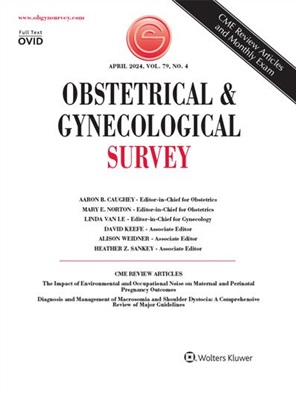Individual and Family Determinants for Quality of Life in Parents of Children With Inborn Errors of Metabolism Requiring a Restricted Diet: A Multilevel Analysis Approach
IF 4.3
4区 医学
Q1 OBSTETRICS & GYNECOLOGY
引用次数: 0
Abstract
ABSTRACT Inborn errors of metabolism (IEMs) requiring a restricted diet can have a significant impact on both children and their caregivers. Previous research has shown conflicting findings in the quality of life (QoL) of caregivers specifically, as many factors can influence daily interactions: home care demands, the potential for acute health crises and hospitalization, dietary constraints, medications, and others. Influencing factors have previously been reported to include emotional, adaptive, and socioeconomic factors, and previous research has varied greatly in sample characteristics, methods of collecting data and measuring QoL, and methods of analysis. This study was performed to clarify previous findings and provide a clearer picture of QoL in parents of children with IEMs requiring a restricted diet compared with the general population based on parent self-report. The final analysis included 785 parents of 578 children with IEMs requiring a restricted diet. Quality of life was assessed using the World Health Organization Quality of Life–BREF and was compared with age- and sex-matched control subjects from the general population. Parents of children with IEMs requiring a restricted diet in this study population experienced a significantly lower QoL in the areas of physical health (mean, −6.09 [SD, 15.01]) and social relationships (mean, −6.82 [SD, 17.71]), as well as a significantly higher QoL in psychological health (mean, +3.10 [SD, 14.25]). Multivariate models were examined to determine factors responsible for these differences in QoL; parental anxiety was negatively associated with all QoL domains. Other factors negatively associated with at least 1 domain included being a father (physical health and social relationships), older parent (physical and psychological health), having an education higher than high school (psychological health), and using more social support–seeking coping strategies (physical health and environment). Factors positively associated with at least 1 domain included having an education level higher than high school (environment), being a working parent (physical and psychological health, environment), and using more positive thinking coping strategies (psychological health). Child-related factors negatively associated with parental QoL included having at least 1 disease complication (social relationships and environment) and a higher number of hospital medical providers (physical health). A child being older positively impacted parental QoL in the environment domain. It is not uncommon for parents of children with chronic diseases or impairments to experience a lower QoL. In this study, some aspects of QoL were enhanced by the demands of caregiving, and some were negatively impacted. Discrepancies in previous literature may be partially attributed to varying tests, variable characteristics within a sample (eg, longer time since diagnosis), or differences in analysis methods. The results in this study indicate a potential need for resources to support parents of children with IEMs requiring a restricted diet. Previous literature has shown efficacy in providing in-home health care professionals for occasional relief of caregiving duties for parents, as well as support groups of parents in similar situations. Parental anxiety in particular was shown to impact QoL negatively in all domains, and thus targeting interventions toward reducing parental anxiety might be one way to improve QoL. The adaptation of parents to their child's condition and to the demands of caregiving could explain some aspects of the QoL difference from the general population, but these differences should still be addressed to improve QoL.个体和家庭因素对需要限制饮食的先天性代谢错误儿童父母生活质量的影响:一项多层次分析方法
需要限制饮食的先天性代谢错误(IEMs)可能对儿童及其照顾者产生重大影响。先前的研究在护理人员的生活质量(QoL)方面显示了相互矛盾的发现,因为许多因素会影响日常互动:家庭护理需求,急性健康危机和住院治疗的可能性,饮食限制,药物治疗等。影响因素包括情绪、适应性和社会经济因素,以往的研究在样本特征、收集数据和测量生活质量的方法以及分析方法方面存在很大差异。本研究旨在澄清先前的研究结果,并根据父母的自我报告,对需要限制饮食的IEMs儿童的父母的生活质量与一般人群的生活质量提供更清晰的了解。最终的分析包括785名父母的578名需要限制饮食的IEMs儿童。使用世界卫生组织生活质量(Quality of life - bref)评估生活质量,并与来自一般人群的年龄和性别匹配的对照受试者进行比较。在本研究人群中,需要限制饮食的IEMs儿童的父母在身体健康(平均值,- 6.09 [SD, 15.01])和社会关系(平均值,- 6.82 [SD, 17.71])方面的生活质量显著较低,而在心理健康方面的生活质量显著较高(平均值,+3.10 [SD, 14.25])。我们检验了多变量模型,以确定造成这些生活质量差异的因素;父母焦虑与生活质量各域呈负相关。与至少1个领域负相关的其他因素包括:为人父亲(身体健康和社会关系)、父母年龄较大(身体和心理健康)、受教育程度高于高中(心理健康)以及使用更多寻求社会支持的应对策略(身体健康和环境)。与至少1个领域正相关的因素包括高中以上教育水平(环境)、有工作的父母(身心健康、环境)和使用更积极的思维应对策略(心理健康)。与儿童相关的因素与父母生活质量呈负相关,包括至少有一种疾病并发症(社会关系和环境)和更多的医院医疗服务提供者(身体健康)。孩子年龄的增大对父母的环境生活质量有积极影响。对于患有慢性疾病或损伤的儿童的父母来说,生活质量较低并不罕见。在本研究中,照顾需求对生活质量的某些方面有促进作用,而对某些方面则有负面影响。先前文献的差异可能部分归因于不同的测试,样本内的可变特征(例如,诊断后较长时间)或分析方法的差异。这项研究的结果表明,可能需要资源来支持需要限制饮食的iem儿童的父母。先前的文献显示,提供家庭医疗保健专业人员偶尔减轻父母的照顾责任,以及在类似情况下的父母支持团体的有效性。在所有领域中,父母焦虑都对生活质量产生负面影响,因此,针对减少父母焦虑的干预可能是改善生活质量的一种方法。父母对孩子的状况和照顾需求的适应可以解释生活质量与一般人群的某些方面的差异,但这些差异仍然需要解决,以提高生活质量。
本文章由计算机程序翻译,如有差异,请以英文原文为准。
求助全文
约1分钟内获得全文
求助全文
来源期刊
CiteScore
2.70
自引率
3.20%
发文量
245
审稿时长
>12 weeks
期刊介绍:
Each monthly issue of Obstetrical & Gynecological Survey presents summaries of the most timely and clinically relevant research being published worldwide. These concise, easy-to-read summaries provide expert insight into how to apply the latest research to patient care. The accompanying editorial commentary puts the studies into perspective and supplies authoritative guidance. The result is a valuable, time-saving resource for busy clinicians.

 求助内容:
求助内容: 应助结果提醒方式:
应助结果提醒方式:


